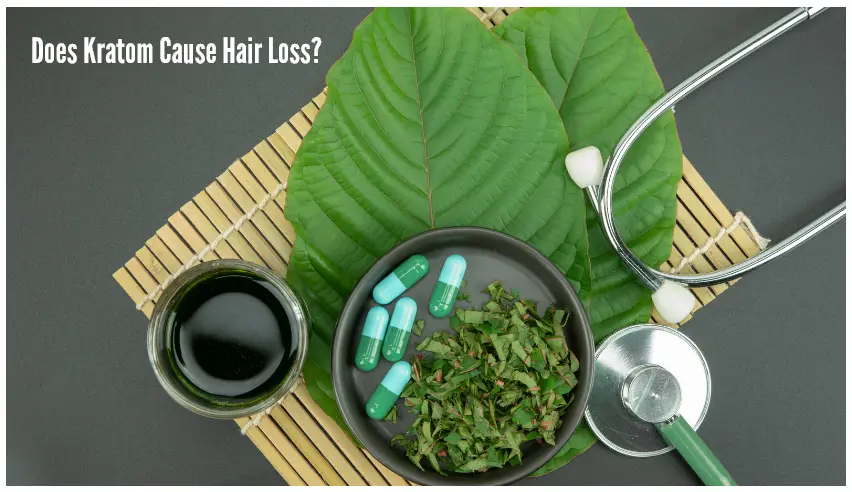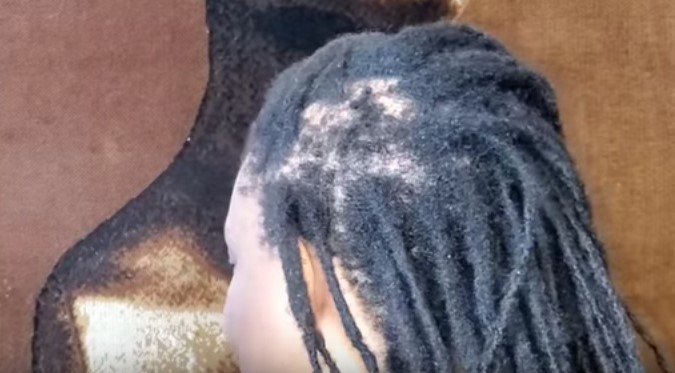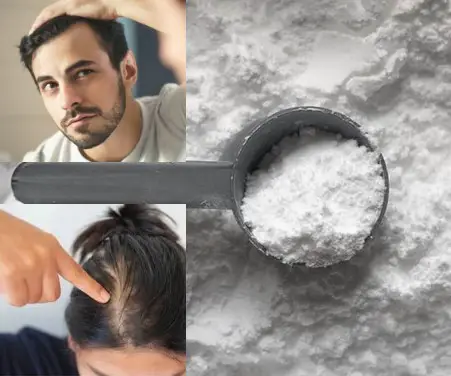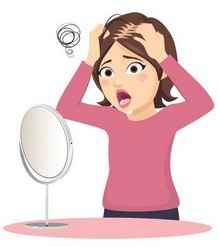Explore the potential link between kratom hair loss in our comprehensive guide. Does kratom cause hair loss in everyone? Discover the research, user experiences, and strategies for addressing potential hair loss related to Kratom use.
Kratom and its potential link to hair loss is a topic that has been garnering a lot of attention lately. As a natural supplement derived from the leaves of the Mitragyna speciosa tree native to Southeast Asia, Kratom has been used for centuries in traditional medicine. Today, it’s consumed in various forms, from capsules and powders to teas and tinctures, by people all over the world seeking its purported benefits. However, amidst the growing popularity of Kratom, there have been increasing reports of potential side effects, one of which is hair loss.
In this comprehensive guide, we’ll delve into the controversy surrounding Kratom and hair loss, examining the research, user experiences, and potential strategies to address this issue. We’ll also explore other factors that could contribute to hair loss, such as inflammation, as discussed in our article Does Inflammation Cause Hair Loss?.
It’s important to note that while we strive to provide accurate and up-to-date information, this article should not replace professional medical advice. If you’re experiencing hair loss and are concerned about its cause, we strongly recommend consulting with a healthcare provider.
Key Takeaways
- Kratom does not cause hair loss in everyone. Individual experiences vary widely, with some users reporting hair loss and others reporting no changes to their hair health.
- The relationship between Kratom dosage and hair loss isn’t fully understood, and more research is needed.
- In addition to potential hair loss, Kratom can cause a range of other side effects, including nausea, dry mouth, and constipation.
- There are several strategies that might help minimize potential side effects like hair loss, including using the lowest effective dose, taking regular breaks, staying hydrated, and eating a balanced diet.
- Always consult with a healthcare provider before starting or stopping any medication or supplement, including Kratom.
In the following sections, we’ll explore the topic of Kratom hair loss in depth, providing you with the knowledge you need to make informed decisions about your health. Whether you’re a long-time Kratom user, considering trying it for the first time, or simply curious about the topic, this article is for you. So, let’s dive in and unravel the mystery of Kratom and hair loss.
What is Kratom?
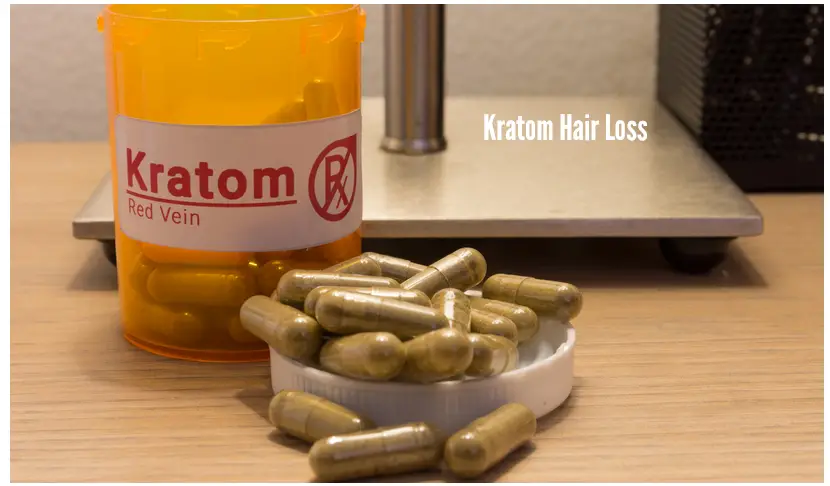
Kratom, scientifically known as Mitragyna speciosa, is a tropical tree native to Southeast Asia. It’s been used in traditional medicine for centuries, primarily in its native regions of Thailand, Indonesia, Malaysia, Myanmar, and Papua New Guinea. The leaves of the Kratom tree contain compounds that can have psychotropic (mind-altering) effects. Today, these leaves are dried and crushed or powdered for various uses [1].
Kratom is consumed in several ways. Some people chew the leaves directly, while others brew them as tea. It’s also common to see Kratom being sold as a supplement in the form of capsules or powders. In some cultures, Kratom is used in social and religious ceremonies and to treat various ailments like pain, anxiety, and depression.
However, the legal status of Kratom varies around the world and even within countries. In the United States, for example, it’s legal in some states and banned in others. It’s crucial to be aware of the legal status of Kratom in your location before deciding to use it.
Interestingly, Kratom isn’t the only herbal supplement that’s been linked to hair loss. Ashwagandha, a medicinal herb used in Ayurvedic medicine, has also been the subject of similar discussions. You can learn more about this in our article on Does Ashwagandha Cause Hair Loss?
In the next section, we’ll delve deeper into the research surrounding Kratom and hair loss. We’ll explore studies that have been conducted, the potential mechanisms behind Kratom-induced hair loss, and the controversies that exist in this field. So, stay tuned!
Kratom and Hair Loss: What Does the Research Say?
When it comes to Kratom and hair loss, the scientific community is still in the early stages of understanding the connection. While anecdotal reports suggest a potential link, rigorous scientific studies are relatively scarce. However, some research points towards a possible mechanism involving prolactin, a hormone that can influence hair growth.
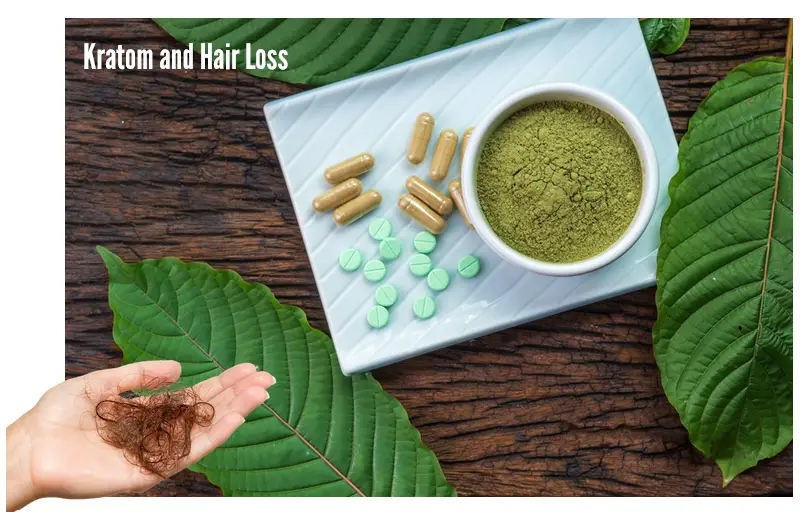
Prolactin is a hormone produced by the pituitary gland in the brain. It’s primarily known for its role in enabling mammals, usually females, to produce milk. However, prolactin has over 300 separate functions in various vertebrates, including humans. One of these functions is hair follicle cycling, and an imbalance in prolactin levels can potentially lead to hair loss.
A study published in the Journal of the American Osteopathic Association suggested that Kratom might raise prolactin levels. This increase could potentially disrupt the hair follicle cycle, leading to hair loss. However, it’s important to note that this is just one potential mechanism, and more research is needed to confirm these findings.
In addition to the potential prolactin connection, other factors could contribute to hair loss in Kratom users. These include nutritional deficiencies due to changes in diet or appetite, stress or anxiety related to Kratom use or withdrawal, and potential interactions with other substances or medications.
It’s also worth noting that hair loss can occur for a variety of reasons, many of which are unrelated to Kratom use. These can include genetic factors, hormonal imbalances, certain medical conditions, and the use of specific medications. For example, our article on Does Nexplanon Cause Hair Loss? explores how a specific form of birth control might contribute to hair loss.
While the research on Kratom and hair loss is still emerging, it’s clear that more studies are needed to fully understand this potential side effect. If you’re a Kratom user experiencing hair loss, it’s crucial to consult with a healthcare provider to explore all possible causes and appropriate treatments.
In the next section, we’ll delve into user experiences and anecdotal evidence surrounding Kratom and hair loss. We’ll explore stories from both those who have and haven’t experienced hair loss while using Kratom, and discuss the role of individual differences and dosage. Stay tuned!
User Experiences and Anecdotal Evidence
While scientific research on Kratom and hair loss is still in its infancy, there’s no shortage of anecdotal evidence and personal stories shared by Kratom users online. These experiences vary widely, reflecting the complexity of the issue and the role of individual differences.
Many users report experiencing hair loss after starting to use Kratom. Some describe noticing more hair falling out during showers or brushing, while others report more significant hair thinning or bald spots. These users often express concern and confusion, unsure whether Kratom is the cause of their hair loss or if it’s due to other factors.
On the other hand, there are also plenty of Kratom users who report no changes to their hair health. Some have been using Kratom for years without experiencing any hair loss, further complicating the picture.
The role of dosage also comes up frequently in these discussions. Some users suggest that higher doses of Kratom are more likely to lead to hair loss, while others argue that frequency of use is a more important factor.
These varied experiences highlight the importance of individual differences when it comes to potential side effects like hair loss. Factors such as genetics, overall health, other substance use, and even stress levels can all influence how a person’s body responds to Kratom.
If you’re a Kratom user and you’re worried about hair loss, it’s important to remember that many factors can contribute to this condition. For example, did you know that certain medications can also lead to hair loss? Check out our article on Can Losartan Cause Hair Loss? to learn more about this.
In the next section, we’ll explore potential strategies for addressing Kratom-related hair loss, including both medical treatments and natural remedies. We’ll also discuss how to use Kratom safely to minimize potential side effects. Stay tuned!
Addressing Kratom-Related Hair Loss
If you’re a Kratom user experiencing hair loss, it’s natural to feel concerned. However, it’s important to remember that hair loss can be addressed in various ways, and the first step is always to consult with a healthcare provider. They can help determine whether Kratom is the likely cause of your hair loss, or if other factors are at play.
Medical Treatments for Hair Loss
There are several medical treatments available for hair loss, including topical solutions like minoxidil (Rogaine), oral medications like finasteride (Propecia), and even surgical options like hair transplant surgery. These treatments can be effective, but they also come with potential side effects and costs, so it’s important to discuss these factors with your healthcare provider.
Natural Remedies for Hair Loss
In addition to medical treatments, there are also various natural remedies that may help with hair loss. These include:
- Eating a balanced diet rich in vitamins and minerals, especially those known to support hair health like vitamin D, biotin, and zinc.
- Using gentle, natural hair care products and avoiding harsh treatments like chemical dyes and heat styling.
- Trying stress management techniques, as stress can contribute to hair loss.
Strategies for Using Kratom Safely
If you choose to continue using Kratom, there are several strategies that might help minimize potential side effects like hair loss:
- Use the lowest effective dose: Some users report that hair loss is more likely with higher doses of Kratom.
- Take regular breaks: This can help prevent tolerance and dependence, and might also reduce the risk of side effects.
- Stay hydrated and eat a balanced diet: Kratom can sometimes cause dehydration and appetite changes, which could potentially contribute to hair loss.
Remember, it’s always important to consult with a healthcare provider before starting or stopping any medication or supplement, including Kratom. They can provide personalized advice based on your health history and current situation.
If you’re interested in learning more about the potential causes of hair loss, check out our article on Does Inflammation Cause Hair Loss?. It explores another potential cause of hair loss and provides useful information that could help you understand your own hair loss better.
In the next section, we’ll answer some frequently asked questions about Kratom and hair loss. We’ll cover questions like “Does Kratom cause hair loss in everyone?” and “How much Kratom can cause hair loss?” Stay tuned!
Frequently Asked Questions
In this section, we’ll address some of the most frequently asked questions about Kratom and hair loss. These questions reflect common concerns and queries that many people have about this topic.
Does Kratom cause hair loss in everyone?
No, Kratom does not cause hair loss in everyone. Many Kratom users report no changes to their hair health. However, some users do report hair loss, suggesting that individual differences play a significant role. Factors such as genetics, overall health, other substance use, and even stress levels can all influence how a person’s body responds to Kratom.
How much Kratom can cause hair loss?
There’s no set amount of Kratom that can cause hair loss. The relationship between Kratom dosage and hair loss isn’t fully understood, and more research is needed. Some users suggest that higher doses are more likely to lead to hair loss, but this hasn’t been scientifically confirmed.
Are there any other reported side effects of Kratom?
Yes, in addition to potential hair loss, Kratom can cause a range of other side effects. These can include nausea, dry mouth, constipation, loss of appetite, and increased urination. More serious side effects can include rapid heart rate, high blood pressure, and in rare cases, seizures. For more information on this, check out our article on Kratom Toxicity and Side Effects.
What are some natural remedies for hair loss?
There are several natural remedies that may help with hair loss. These include eating a balanced diet, using gentle hair care products, and managing stress. For more detailed information on this, refer to our section on “Natural Remedies for Hair Loss” above.
Conclusion
In this article, we’ve explored the complex topic of Kratom and hair loss. While scientific research on this potential side effect is still emerging, anecdotal evidence suggests that some Kratom users do experience hair loss. However, it’s important to remember that individual differences play a significant role, and not everyone who uses Kratom will experience this side effect.
We’ve also discussed potential strategies for addressing Kratom-related hair loss, including both medical treatments and natural remedies. Remember, if you’re a Kratom user experiencing hair loss, it’s crucial to consult with a healthcare provider. They can help determine whether Kratom is the likely cause of your hair loss, or if other factors are at play.
Finally, we’ve addressed some frequently asked questions about Kratom and hair loss. We hope this information has been helpful and has provided a comprehensive overview of this topic.
If you’re interested in learning more about the potential causes of hair loss, we encourage you to explore our other articles. For instance, you might find our article on Does Vyvanse Cause Hair Loss? informative. It explores how a specific medication might contribute to hair loss.
Remember, knowledge is power. The more you understand about your body and the substances you put into it, the better equipped you’ll be to make informed decisions about your health.
Related Articles:
- AI Powered Bald Filter Online 2024: See Yourself with No Hair! - January 19, 2024
- Harklinikken Bad Reviews 2024: Analyzing Negative Feedbacks - January 18, 2024
- How to Get the Alex Eubank Hair | Step-By-Step Tutorial 2024 - January 18, 2024

